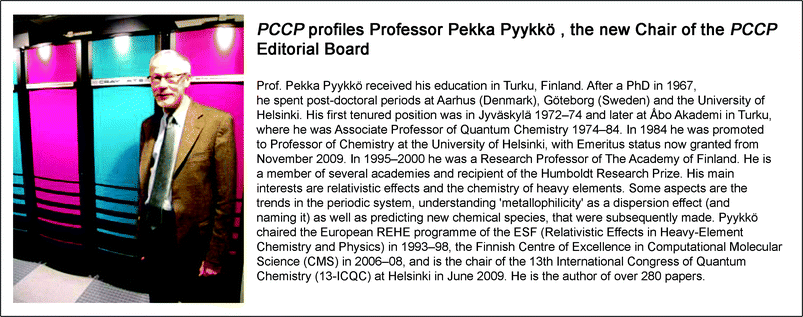Building on our achievements
Pekka Pyykköa and Philip Earisb
aDepartment of Chemistry, University of Helsinki, Helsinki, 00014, Finland. E-mail: Pekka.Pyykko@helsinki.fi; Tel: +358 (0)0![[thin space (1/6-em)]](https://www.rsc.org/images/entities/char_2009.gif) 358
358![[thin space (1/6-em)]](https://www.rsc.org/images/entities/char_2009.gif) 9
9![[thin space (1/6-em)]](https://www.rsc.org/images/entities/char_2009.gif) 191
191
bRoyal Society of Chemistry, Science Park, Milton Road, Cambridge, UK CB4 0WF. E-mail: earisp@rsc.org; Tel: +44 (0)1223![[thin space (1/6-em)]](https://www.rsc.org/images/entities/char_2009.gif) 432
432![[thin space (1/6-em)]](https://www.rsc.org/images/entities/char_2009.gif) 168
168
Abstract
Welcome to the first issue of PCCP of 2009, where we celebrate 10 years of successful publication of the journal. In this Editorial we highlight some of the achievements made by PCCP in recent months, as well as look forward to the future and show how we will be building on those achievements to improve further the service we offer to the community.
A record-breaking year
We are proud of PCCP’s continuing development since our launch at the beginning of 1999. Indeed, the ongoing excellent health of PCCP is perhaps exemplified by three notable statistics from 2008:• Submissions grew by over 27% in 2008 compared to the previous year, rising to a new record high. More than 2000 submissions were received for the first time.
• The size of the published journal grew accordingly. 2008 was our biggest volume yet, with over 7000 pages being published for the first time.
• The impact factor of PCCP yet again enjoyed another big rise, of over 15% (Fig. 1). The journal’s impact factor now stands at 3.34; again, a new record.
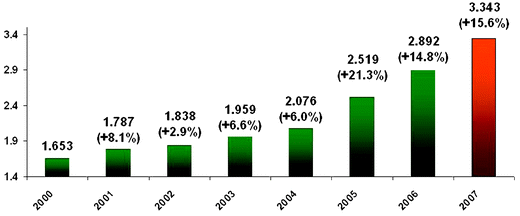 | ||
| Fig. 1 The impressive development in the impact factor of PCCP. | ||
Commitment to quality
The latest increased impact factor continues the trend of recent years, and reflects our strength in publishing physical chemistry research of the highest quality.The PCCP Editorial Board has recently been re-examining PCCP’s scope and requirements for publication. Such a re-evaluation is the sign of a healthy and dynamic journal, and will ensure the journal remains topical and serves our readers with some of the very best papers in physical chemistry, chemical physics and biophysical chemistry.
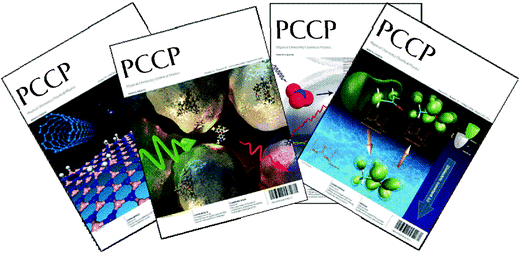 | ||
| Fig. 2 Some of the attractive PCCP cover designs in 2008. | ||
With this in mind, the Editorial Office and Board remain committed that work published in PCCP continues to be insightful research of the highest quality, and that our subject scope reflects and keeps pace with the evolving research activities of the broad communities we serve.
Papers in research areas such as spectroscopy, dynamics, kinetics, statistical mechanics, thermodynamics, electrochemistry, catalysis, surface science, quantum mechanics and theoretical developments continue to play an important part in the journal. Interdisciplinary research areas such as polymers and soft matter, materials, nanoscience, surfaces/interfaces, and biophysical chemistry are especially welcomed whenever they include a physico-chemical approach. We anticipate further growth in the size of the journal in 2009, to ensure we are publishing an appropriate depth of research across this whole broad scope.
We are absolutely committed to keeping the standards for publishing in PCCP high, and of course will maintain our high standards with our rigorous but fair peer-review procedures. We will not compromise on the quality of our articles, and the rejection rate for submissions remains about 60%.
Authors and referees are therefore reminded that to be suitable for publication in PCCP, articles must include significant new physical insights; this is the prime criterion that submissions will be judged against. Purely synthetic research, routine work and applications of established techniques are not suitable for PCCP. We have recently introduced a new “coversheet” to every manuscript we send out for review, to remind referees of these standards.
Perspectives
Our ‘‘PCCP Perspective’’ feature articles, first introduced in 2007, continue to be very popular and attract much attention. Perspectives are designed to be review-style articles, where authors can present a state-of-the-art review from their authoritative viewpoint, critically analysing a topic of current interest.We were delighted to publish many excellent Perspectives in 2008. You may be interested to learn the two most-accessed from our website were the Perspective on 4D electron imaging by Nobel prize-winner Ahmed Zewail (DOI: 10.1039/b801626g), and the Perspective on the enhancement of the photocatalytic activity of TiO2 by PCCP Advisory Board member Avelino Corma (DOI: 10.1039/b712168g). Incidentally, accesses of papers from the PCCP website more than doubled in 2008, showing that PCCP is the place to publish attention-grabbing research.
Avelino’s article was published as one of a series of “10th anniversary” articles, designed to celebrate the 10th birthday of the journal. Each article was written by authors who have played a significant part in our history, and the articles are collected together (along with interviews with the authors) on a special page on our website: www.rsc.org/pccp
We look forward to many further Perspectives in 2009, and I hope you enjoyed reading those especially selected for publication in this issue.
PCCP: An international Society journal
PCCP has always prided itself on being a Society journal. The journal is owned by national chemical societies, and published on a not-for-profit basis for the benefit of the scientific community.We are delighted that two new Owner Societies have very recently joined the PCCP Partnership—the Royal Australian Chemical Institute, and the New Zealand Institute of Chemistry. This takes the number of Owner Societies to 16, and is an excellent reflection of the truly international nature of PCCP. PCCP thrives in part due to the Societies which own and support it (a full list can be found on the inside front cover of the journal or on our website), and we look forward to close collaborations with both new and existing Owner Societies in the months ahead.
PCCP prizes and conference activities
As a Society journal, we are always looking to support the physical chemistry and chemical physics communities. In 2008 we have continued to award sponsored Poster Prizes at a variety of scientific meetings, to reward some of the best new research.Over 2008 we were again proud to award three PCCP Prizes for “Outstanding Achievement of a Young Scientist in Physical Chemistry and Chemical Physics in Japan”, as well as award additional Poster Prizes (Fig. 3) throughout the year at conferences in international locations including China, USA, Italy, Germany, Spain and the UK, and in subjects areas including catalysis, biophysical chemistry, stereodynamics, nanoscience, and theoretical advances.
We offer our congratulations to all PCCP prize-winners, and look forward to seeing their winning research in the journal soon. Further prizes are planned at select key conferences over the course of 2009. If any readers have suggestions for conferences where we could offer sponsorship or PCCP prizes please do contact the Editorial Office—E-mail: pccp@rsc.org
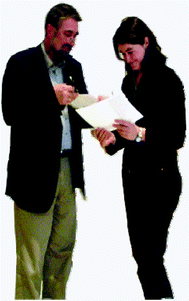 | ||
| Fig. 3 PCCP Editorial Board member Professor Manfred Martin awarding a PCCP poster prize. | ||
The PCCP Editorial Team also continue to attend a number of conferences around the world, to make sure we are aware of the very latest research developments, as well as to meet authors, readers and referees and get their feedback about the journal. If PCCP is represented at a conference you’re attending, please do come and say ‘‘Hello’’.
Themed issues
High-profile themed issues on topical areas of current interest continue to be an important feature of PCCP. Weekly publication of the journal gives us the flexibility to enhance the journal with a number of such issues each year, and in 2008 we published successful themed issues on Manipulation and Simulation at the Nanoscale, Stacking Interactions, Local Correlation Methods, Electrocatalysis, and Water at Interfaces.A lively mix of further themed issues are planned for 2009, starting with themes on Coarse Grained Modelling of Soft Condensed Matter, Metal Oxide Nanostructures, and Molecules in Confined Spaces. Further details about these and other themed issues “in the pipeline” are available on our website, www.rsc.org/pccp
As a new benefit, all authors of papers published in PCCP themed issues will receive a complimentary print-copy of the issue when it is published, as well as get all our usual benefits including very quick publication times, flexibility in file formats and article layouts at the submission stage, and the use of free colour (where it enhances the scientific understanding of Figures).
Any further ideas for focused themed issues you may have are naturally very welcome—please do send suggestions to E-mail: pccp@rsc.org
Editorial Board changes
Three Editorial Board members—Professors Phil Bartlett, Vincenzo Schettino and Bert Weckhuysen—completed their respective terms of office at the end of 2008, and receive our warmest thanks for their substantial contributions to the development and success of PCCP.We would like to single out Professor Bert Weckhuysen for a special mention. Bert has served as the Chair of the PCCP Editorial Board for the past three years. He has contributed much to the journal over the years as an author and referee, but also as Board Chair by providing guidance and putting into place the strategies that have led to consistently robust scientific standards and the really positive growth in submissions, quality, impact and visibility described in this Editorial. Bert has a busy time at the moment with the recent birth of his baby daughter Anne (Fig. 4), but will continue to offer his support from the Advisory Board.
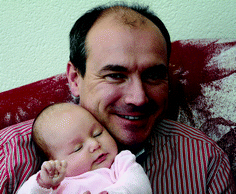 | ||
| Fig. 4 Retiring PCCP Editorial Board Chair Professor Bert Weckhuysen relaxing with baby Anne. | ||
We’re delighted to announce the new Chair of the Editorial Board will be Professor Pekka Pyykkö, from the University of Helsinki. Pekka has been a member of the Board since the beginning of 2006, and has broad research interests in theoretical chemistry, including relativistic effects in heavy-element chemistry. He is of course a frequent author in PCCP, and a brief profile accompanies this Editorial. Pekka says: “I have pleasure in taking on this role. The recent progress made by the journal is excellent news, and I look forward to building on our achievements in the months and years ahead.’’
Further good news is that Professors Julie MacPherson (Warwick) and Vincenzo Barone (Napoli) will be joining the Editorial Board from the beginning of 2009, bringing a wealth of valuable experience.
It also gives us pleasure to extend a warm welcome to three new members of our Advisory Board—Professors Stefan Grimme, Jeroen Van Bokhoven and Anne Zehnacker-Rentien. We thank all retiring Advisory Board members for their valued input.
Finally, we would also like to take this opportunity to welcome Professor Gerhard Ertl—a long-standing PCCP author and winner of the 2007 Nobel Prize in Chemistry for his pioneering surface science research—as a new member of the PCCP Honorary Board. We are delighted to receive support from our Honorary Board members, and indeed this issue contains papers by Honorary Board members Richard Zare (DOI: 10.1039/b814133a) and Joshua Jortner (DOI: 10.1039/b819126n).
Full details of the PCCP Honorary, Editorial and Advisory Boards can be found on our website, www.rsc.org/pccp
Looking to the future
This is a time of many successes for PCCP. No successful journal can rest on its laurels though, and we are looking forward to building on our achievements over the coming months and years. As ever, we would like to highlight everyone in the scientific community who has contributed to the successes of the journal. It is the authors, readers and referees who make PCCP what it is, and we thank you all for your support.We continue to try to take the journal forward so that it fully meets the aspirations of the broad physical chemistry, chemical physics and biophysical chemistry communities we serve. We always welcome comments, suggestions and feedback; as ever, please do contact us at E-mail: pccp@rsc.org with your views.
With our very best wishes for the New Year,
Philip Earis
Editor, PCCP
Pekka Pyykkö
Chair, PCCP Editorial Board
News from RSC Publishing
Same great ReSourCe—just better!
During 2009 we will release a new version of ReSourCe, our system for online manuscript submission and peer review (www.rsc.org/resource). Already popular with authors and referees, we’ve listened to your feedback and made further improvements to our service. We’re keen to build on your experience of ReSourCe, so if you would you like to help us shape the next release by taking part in beta-testing or by supplying your comments and suggestions please contact E-mail: resourcesupport@rsc.orgMore papers and greater impact
As we look forward to 2009, RSC Publishing is working with more authors than ever before—2008 saw the number of authors published in RSC journals increase by 30%. Meanwhile, titles from across the collection recorded impressive rises in impact factors, and the latest immediacy indices confirm the relevance and topicality of research published by the RSC.RSC Publishing is committed to providing a world-class publishing service and global visibility to its authors and with the number of citations increasing, immediacy and impact factors rising it is clear to see that PCCP and RSC Publishing are recognised by researchers throughout the world as a key resource to publish and read the very best research.
“I must say that the RSC has done a great job over the past few years of reinventing its chemistry journals. In my opinion they are now the best in the world for publishing first rate topical modern chemistry in a rigorous yet appelaing and accessible form.”
Professor Stephen Kent, University of Chicago.
Your RSC subscriptions and free content
We know that it can be difficult to keep track of online resources that are available to you. So, we’ve introduced a special web page to help you to find out exactly what RSC content you can access. This new page is called Your RSC Subscriptions (www.rsc.org/Publishing/your_access.asp) and it lists all products for which your organisation has a current subscription, plus other content which may be available to you, such as the RSC Journals Archive and the RSC eBook collection.You can also find out about RSC content that is available free—including: research articles that are free for a limited time, news articles in magazines and free chapters from the RSC eBook Collection. Visit: www.rsc.org/Publishing/freeRSCcontent.asp
New journals
Our journal portfolio has expanded with the launch of three new journals.The new RSC journal Energy & Environmental Science, launched Summer 2008, has had a tremendously successful start, publishing the most topical research for all aspects of the chemical sciences relating to energy conversion and storage, alternative fuel technologies, and environmental science. Visit the website and read the latest issue of Energy & Environmental Science and register to access all issues for free throughout 2009 at www.rsc.org/ees
Metallomics: Integrated biometal science covers the research fields related to metals in biological, environmental and clinical systems (www.rsc.org/metallomics).
Integrative Biology: Quantitative biosciences from nano to macro is a unique, interdisciplinary journal covering quantitative multi-scale biology using enabling technologies and tools to exploit the convergence of biology with physics, chemistry, engineering, imaging and informatics (www.rsc.org/ibiology).
The current issue of all three journals is freely available online. Free online institutional access to all 2009 content is available for registered users—full details are on the web site.
RSC eBook Collection
The RSC eBook Collection has become a world-class electronic resource with licenses being signed to leading institutions across the globe. New content continues to be uploaded regularly and this comprehensive resource now includes over 800 quality titles. Electronic book publications are uploaded within days of print publication, effortlessly disseminating extensive, high-quality, scientific content direct to scientists, libraries, students, teachers and researchers around the world. Please visit www.rsc.org/eBooks for further information or to visit the RSC eBook Collection.Over 80 new print books will be published in 2009 as our list continues to grow in size and importance in the international market. Keep up-to-date with all the latest cutting edge titles being published by the RSC by visiting www.rsc.org/ej_alert and subscribing to our eAlerts. We send regular information on discount offers, print books and new electronic content throughout the year.
| This journal is © the Owner Societies 2009 |

